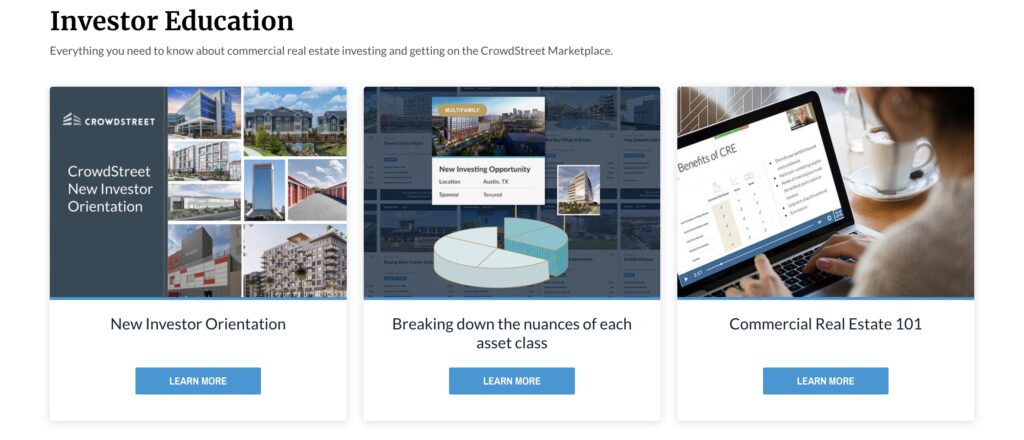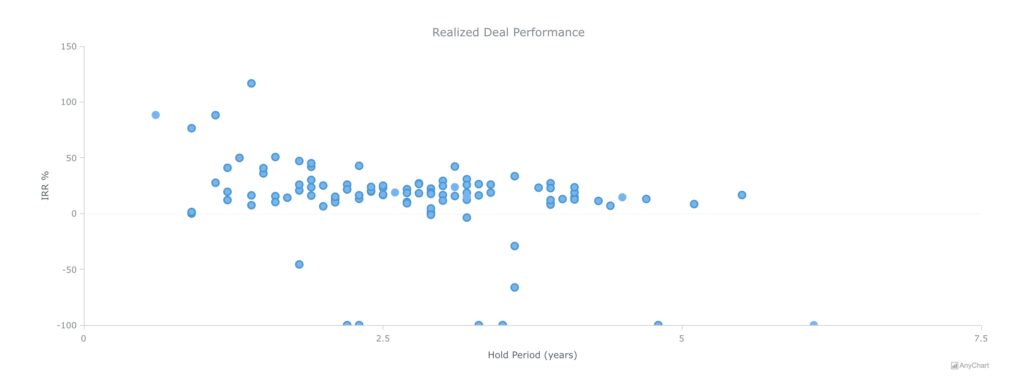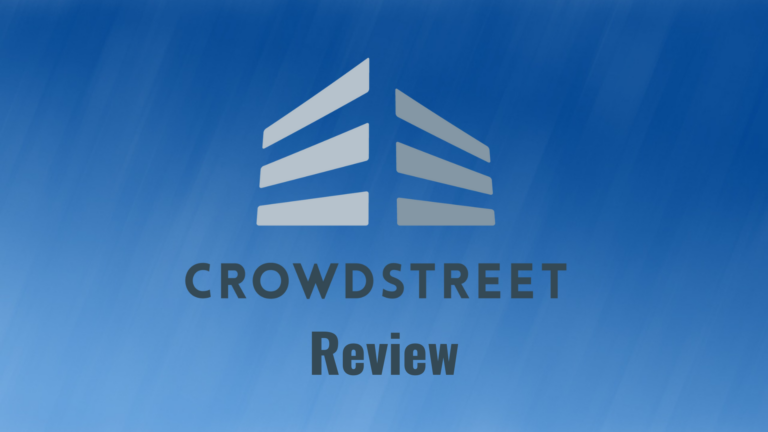With all the volatility in the stock market these days, you may be wondering what other options are out there for you to invest your hard-earned money in.
Real estate is the third-largest asset class in the United States (after stocks and bonds).
Previously, it has been difficult for investors to gain access to real estate without physically owning property.
But platforms such as CrowdStreet are letting investors get into the real estate game without ever touching a shovel!
This CrowdStreet review will introduce you to the platform, tell you what securities CrowdStreet offers, and walk you through their past performance.
What Is CrowdStreet?
CrowdStreet was founded in 2012 by Tore Steen and Darren Powderly.
After the financial crisis that began in 2008, the co-founders thought that people were relying too much on the stock market (and getting burned for doing so).
They wanted to create access to asset classes outside of public equities, which often don’t get enough attention.
However, commercial real estate came with a pretty significant barrier to entry at the time: most people don’t have billions of dollars sitting around to use to fund the construction of a new office building.
But with the emergence of crowdfunding as an investment method, Steen and Powderly saw an opportunity to help investors get into a previously closed-off asset class using partial investments.
There are thousands of investors on CrowdStreet that have invested in at least one project.
These investors have invested over $3.49 billion to fund more than 661 projects.
Now, onto the CrowdStreet review!
What Can I Invest In On CrowdStreet?

There are plenty of different securities you can invest in on CrowdStreet, all of which involve investing in commercial real estate.
You can invest in an individual project, such as the construction of a senior living facility.
You can also invest in a fund that finances multiple commercial real estate projects.
You can also invest in real estate investment trusts (REITs), multifamily buildings, apartments, hotels, and retail spaces.
The projects open for investment on CrowdStreet are passive investments.
This means that you don’t take an active part in the construction / rehabilitation of the properties you’re investing in.
You simply choose which projects you want to help crowdfund, invest your money, and (hopefully) collect your gains!
Like the CrowdStreet website says, “you’re a passive investor, not the landlord.”
CrowdStreet does not currently have a mobile app.
For now, you can only invest on and interact with the platform from your computer.
Why Invest In Commercial Real Estate?

If you’ve read our article on The First Stock Everyone Should Buy, you know that investing in different securities that are uncorrelated (or negatively correlated) can help you mitigate some of your investment risk.
That way, when one security performs poorly, another uncorrelated security may perform well (or not as poorly), and you won’t experience as big of a loss.
Real estate is relatively uncorrelated with the stock market, meaning that it can be used to help mitigate the risks of investing in stocks.
CrowdStreet Fees
The cost of investing on CrowdStreet depends on which projects and funds you invest in.
CrowdStreet does not charge its investors any fees. Instead, it charges sponsors fees to open up their projects to investors on the platform.
The sponsors, however, may charge CrowdStreet investors fees to invest in their projects.
So while it is possible to use CrowdStreet for free, you may end up paying fees for individual projects.

Only accredited investors can invest on CrowdStreet.
Accredited investors are those individuals who have a net income of $200,000 or more ($300,000 or more for married couples), or a net worth of $1 million or more.
Business entities can be accredited investors as well, provided they have enough assets.
Accreditation is required to invest in securities that are not regulated by the Securities and Exchange Commission (SEC).
The SEC requires accreditation for these types of investments in order to protect investors who are not as financially sophisticated from suffering big losses on risky investments.
There are some investment minimums you’ll need to keep in mind when investing on CrowdStreet.
For example, you need to invest at least $25,000 in any given project.
Some projects and funds have a minimum investment of $100,000.

It’s important to know that the money you invest on CrowdStreet will likely not be liquid for several years.
Commercial real estate projects tend to be large undertakings that take years to complete, and the money you invest in these projects will be inaccessible for the duration of the projects.
Please note that this investment style differs from investing in stocks through a brokerage account.
When you invest through a regular, taxable brokerage account, you can (usually) sell off your stocks at any time.
Crowdfunding real estate projects is a longer-term commitment.
As noted above, the average hold period for CrowdStreet projects is 2.9 years.
CrowdStreet Performance

In this section of the CrowdStreet review, we’ll go over how CrowdStreet has performed in the time it’s been in business.
As you can see, the CrowdStreet platform boasts some pretty promising performance metrics.
The internal rate of return (IRR) of 17.5% means that CrowdStreet investors earn a 17.5% annualized return on the projects they invest in.
The equity multiple of 1.5 means that CrowdStreet investors recover about one and a half times the cash that they invest in projects.

This chart shows where CrowdStreet’s calculations for its historical performance came from.
You’ll see that the IRRs do indeed cluster around the 17% range.
You’ll also notice that about 11 of CrowdStreet’s projects have produced a negative IRR, meaning that investors received a negative return on the projects and did not recover all of their invested capital.
In fact, six of these 11 projects produced an IRR of -100% and an equity multiple of 0%, meaning that investors lost all of their invested cash.
While this is only a minority of the deals that CrowdStreet has done, it’s important to remember that returns are never guaranteed when you take on risk with your money.
Final Thoughts
At the end of the day, the best investment for you is the one that best fits your risk profile and makes you comfortable with what you’re doing with your money.
We hope you’ve found this CrowdStreet review helpful and that you know that there are other asset classes available to you besides stocks and bonds, if you’d like to give them a shot.
Ranking of Top Stock Newsletters Based on Last 3 Years of Stock Picks as of December 27, 2025
We are paid subscribers to dozens of stock and option newsletters. We actively track every recommendation from all of these services, calculate performance, and share our results of the top performing stock newsletters whose subscriptions fees are under $500. The main metric to look for is "Return vs S&P500" which is their return above that of the S&P500. So, based on December 27, 2025 prices:
Best Stock Newsletters Last 3 Years' Performance
| Rank | Stock Newsletter | Picks Return | Return vs S&P500 | Picks w Profit | Max % Return | Current Promotion |
|---|---|---|---|---|---|---|
| 1. |  Alpha Picks | 82% | 56% | 76% | 1,583% | February SALE: SAVE $50 NOW |
| Summary: 2 picks per month based on Seeking Alpha's Quant Rating; consistently beating the market every year since launch; tells you when to sell and they have sold almost half. See complete details in our full Alpha Picks review. Or get their Premium service to get their QUANT RATINGS on your stocks to better manage your current portfolio--read our Is Seeking Alpha Worth It? article to learn more about their Quant Ratings. | ||||||
| 2. |  Zacks Value Investor | 60% | 40% | 54% | 692% | February Promotion: $1, then $495/yr |
| Summary: 10 stock picks per year on January 1st based on Zacks' Quant Rating; Retail Price is $495/yr and includes 6 different services including those below. Read our Zacks Review. | ||||||
| 3. |  Moby.co | 50% | 16% | 74% | 2,569% | February Promotion: Next pick free! |
| Summary: 60-150 stock picks per year, segmented by industry; consistently beating the market every year; retail price is $199/yr. Read our full Moby Review. | ||||||
| 4. |  Zacks Top 10 | 36% | 15% | 71% | 170% | February Promotion: $1, then $495/yr |
| Summary: 10 stock picks per year on January 1st based on Zacks' Quant Rating; Retail Price is $495/yr and includes 6 different services. Read our Zacks Review. | ||||||
| 5. |  TipRanks SmartInvestor | 20% | 9% | 62% | 464% | Current Promotion: Save $180 |
| Summary: About 1 pick/week focusing on short term trades; Lifetime average return of 355% vs S&P500's 149% since 2015. Retail Price is $379/yr. Read our TipRanks Review. | ||||||
| 6. |  Action Alerts Plus | 27% | 5% | 66% | 208% | Current Promotion: None |
| Summary: 100-150 trades per year, lots of buying and selling and short-term trades. Read our Jim Cramer Review. | ||||||
| 7. |  Zacks Home Run Investor | 5% | -0.4% | 45% | 241% | February Promotion: $1, then $495/yr |
| Summary: 40-50 stock picks per year based on Zacks' Quant Rating; Retail Price is $495/yr. Read our Zacks Review. | ||||||
| 8. | Dogs of the Dow Strategy | 16% | -1.8% | 43% | 44% | Current Promotion: None |
| Summary: Buy the 10 highest yielding dividends stocks in the Dow Jones Industrial Average on January 1st and sell on Dec 31st each year. | ||||||
| 9. | IBD Leaderboard ETF | 11.4% | -1.8% | n/a | n/a | February Promotion: NONE |
| Summary: Maintains top 50 stocks to invest in based on IBD algorithm; Retail Price is $495/yr. Read our Investors Business Daily Review. | ||||||
| 10. |  Stock Advisor | 34% | -3.9% | 75% | 289% | February Promotion: Get $100 Off |
| Summary: 2 picks/month and 2 Best Buy Stocks lists focusing on high growth potential stocks over 5 years; Retail Price is $199/yr. Read our Motley Fool Review. | ||||||
| 11. |  Zacks Under $10 | -0.2% | -4% | -4.3 | 263% | February Promotion: $1, then $495/yr |
| Summary: 40-50 stock picks per year based on Zacks' Quant Rating; Retail Price is $495/yr. Read our Zacks Review. | ||||||
| 12. |  Rule Breakers | 34% | -5.1% | 69% | 320% | Current Promotion: Save $200 |
| Summary: Rule Breakers is included with the Fool's Epic Service. Get 5 picks/month focusing on disruptive technology and business models; Lifetime average return of 355% vs S&P500's 149% since 2005; Now part of Motley Fool Epic. Read our Motley Fool Epic Review. | ||||||
| Top Ranking Stock Newsletters based on their last 3 years of stock picks covering 2025, 2024, and 2023 performance as compared to S&P500. S&P500's return is based on average return of S&P500 from date each stock pick is released. NOTE: To get these results you must buy equal dollar amounts of each pick on the date the stock pick is released. Investor Business Daily Top 50 based on performance of FFTY ETF. Performance as of December 27, 2025. | ||||||
